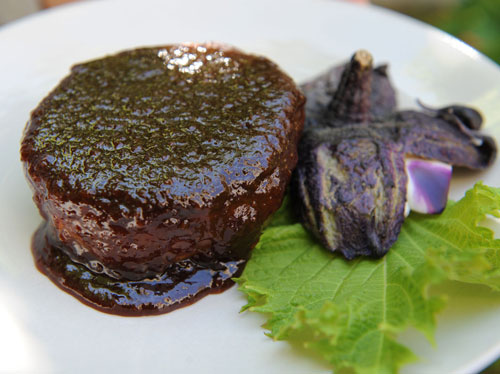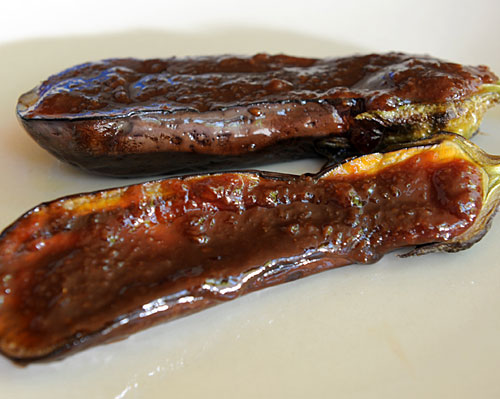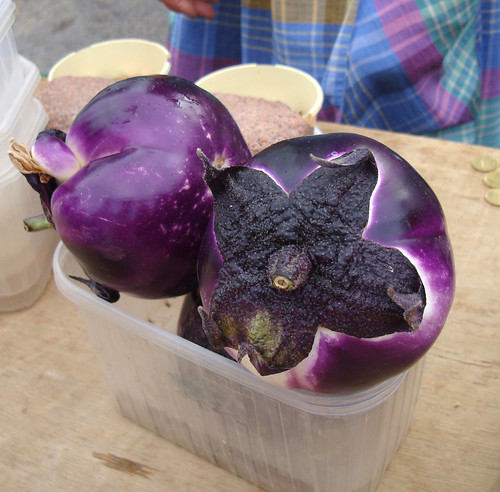Nasu no miso dengaku: Japanese slow-roasted eggplant with dengaku sauce

It's still summertime, but I can feel the cooler days of fall coming, especially in the evenings when the temperature is dropping just a bit more than it did a few weeks ago. This is one of the best times of the year for food lovers, especially if you love vegetables.
Eggplants (aubergines) are in high season now and will be around for at least another month or so. While you can get them year-round, they are at their best of course in their natural season.
This is a classic Japanese way of serving eggplant, and it's really easy. All you do is to slowly roast the eggplant until tender, either in the oven or on the stovetop in a frying pan, then serve with a glossy, salty-sweet dengaku (田楽)sauce. I could eat this every day, with a bowl of plain rice and some cold mugicha to wash it down.
Recipe: Slow roasted eggplant (aubergine) with dengaku sauce (nasu no miso dengaku 茄子の味噌田楽)

Serves 1-2, depending on what else is served at the same meal.
- 1 large, round or 2-3 small, fresh eggplants. Try to get ones with thin skins.
- Olive or sesame oil
For the dengaku sauce:
- 3 Tbs. miso. Here I've used a haccho miso (八丁味噌)with some texture to it, but any miso you like will do. See Japanese miso primer.
- 1 Tbs. sugar
- 1 Tbs. sake
- 1 Tbs. mirin
- 1 tsp. grated fresh ginger
- 1 tsp. olive oil or sesame oil
- water
Prepare the eggplant, according to the type:
If you're using a big round one: Cut off the blossom end, and reserve to use as a decoration.
If you are using a big long one (e.g. the standard Italian or American type eggplant): Take off the blossom end (optionally reserve for use as decoration) and cut the eggplant into thick slices crosswise, or into half lengthwise. (Note that I don't recommend this type of eggplant for this, since the skin tends to be rather tough. Choose one of the other kinds if you can.)
If you're using a small thin Asian-type eggplant: Cut in half lengthwise, keeping the blossom end on for decorative purposes.
Rub the cut surfaces of the eggplant with a little sesame or olive oil. Roast it in an oven at 200°C / 400°F, cut side down and tented with some loose foil until tender (the time depends on the size of the eggplant, but it's about 10 minutes for a small eggplant, 30 minutes for a big eggplant, with the slices somewhere in between). It's tender when you can pierce through easily with a skewer. You can try cooking the eggplant in a toaster oven too, but I haven't tested this myself so you're on your own as to timing and so on.
Alternatively, you can slow-roast the eggplant in a dry frying pan. Place cut-side down in a non-stick pan, and cover loosely with some aluminum foil. Pan-roast until tender over medium-low heat, turning once. This method is especially suited for small eggplant - it takes 5-10 minutes and doesn't heat up the kitchen as much as the oven method.
While the eggplant cooks, prepare the dengaku sauce. Combine all the ingredients in a small pan, and set over low heat. Mix the sauce vigorously with a wooden spoon, until the sauce turns glossy. Adjust the consistency by adding drops of water. It should not be too runny, but should flow thickly, rather like a thick ketchup.
Serve the eggplant warm, coated with sauce.
About dengaku sauce
Dengaku (田楽 - the characters mean 'rice paddy' + 'harmony' or 'music' or 'play') is a classic miso based sauce. There are many variations, but the basics are the same: miso with sweetener, a little oil for adding gloss, and sake and/or mirin for added flavor. Sometimes a little soy sauce is added, or dashi stock instead of water, or even MSG. My version comes from my mother, of course, and is quite simple.
You can make dengaku sauce in quantity and keep it in a closed jar in the refrigerator, but I don't bother since it's so easy to make fresh. If you do make it and store it, warm it up a bit before using.
Dengaku sauce is terrific on other grilled or roasted vegetables, firm tofu, blanched konnyaku, and so on. It's a bit sweet for my taste for serving on meat and fish, but you can try it out!
Add spice to dengaku-sauced foods by sprinkling on some shichimi tohgarashi (7-ingredient pepper, see Essential staples of a Japanese pantry).
Big, fat, round eggplant
These are the eggplants I used for the version at the top of the page, bought at my favorite farmer's market in Provence:
You might be thinkng, "But Japanese eggplants are small and thin and cute!" Well the standard ones are, but in Kyoto (the home of Japanese haute cuisine) there is a variety of eggplant that is similar to the one in the photo called kamonasu (賀茂茄子)- big, round, and quite thin-skinned. Here's a photo of one.
There's nothing like the combination of juicy, soft eggplant with that sweet-salty, thick dengaku sauce. Wait, I think I need to go to the market today...
Other favorite eggplant recipes from the archives:
- Japanese country style stewed eggplant (nasu no inakani)
- Steamed eggplant with spicy peanut sauce
- Grilled eggplant and mushroom miso soup (you can make this just with eggplants)
- Ratatouille
If you enjoyed this article, please consider becoming my patron via Patreon. ^_^


 Welcome to Just Hungry, where we serve authentic Japanese recipes and more! I'm
Welcome to Just Hungry, where we serve authentic Japanese recipes and more! I'm 













Comments
Takat
14 August, 2009 - 13:48
Permalink
Re: Nasu no miso dengaku: Japanese slow-roasted eggplant ...
Wow, now I'm upset I already cooked and ate my last two eggplant(s?) last night! Oh well. They were delicious, too, and there's always more where they came from :)
Glad to see more posts, Maki!
Takat
Writing away about my latest 3 week adventure through China at the Katacomb
umami
14 August, 2009 - 15:24
Permalink
Re: Nasu no miso dengaku: Japanese slow-roasted eggplant ...
Thank you for this recipe. I love this dish but most recipes specify frying, which I dare not do much of. Definitely buying some eggplant tomorrow at the market.
Dhanggit
14 August, 2009 - 15:58
Permalink
Re: Nasu no miso dengaku: Japanese slow-roasted eggplant ...
oh my this looks really amazing!! i love the color of this nasu really bright and fresh!!
Loretta
14 August, 2009 - 17:20
Permalink
Re: Nasu no miso dengaku: Japanese slow-roasted eggplant ...
With motherhood almost upon me there are still a few Japanese dishes I want to incorporate into my repertoire but am conscious that I haven't learned, never mind mastered yet,
And then within days of each other you publish two of them!
The last was your own mother's "saba no miso ni" - I haven't had the chance to make it yet, but I'm so thrilled and grateful that she allowed you to share it with us.
And now this one for nasu no miso dengaku.
Happily I just happen to have all the ingredients to hand for this one so this will be this evening's meal.
(And the saba no miso ni ended up inspiring a new furikake combination which I just finished eating. I've posted a miso/sesame/bran/ginger recipe in the forum section but I mixed this with a furikake recipe where I dry 'roast' a can of mackerel with a 50/50 soy sauce & mirin dressing in a hot pan.)
Stephanie
14 August, 2009 - 18:21
Permalink
Re: Nasu no miso dengaku: Japanese slow-roasted eggplant ...
So strange I was just thinking how nice it would be grill some eggplant for a BBQ I am having on Saturday, and here on your site is a lovely looking eggplant recipe. Though I will have to stick to my house special for the BBQ, I will definitely have to give this one a try while it is in season.
Lynda
14 August, 2009 - 20:05
Permalink
Re: Nasu no miso dengaku: Japanese slow-roasted eggplant ...
Thank you for this recipe - the sauce sounds divine and addictive. I am always looking for different ways to prepare eggplant, especially now with all the varieties appearing in the farmer's markets.
Taters
15 August, 2009 - 23:21
Permalink
Re: Nasu no miso dengaku: Japanese slow-roasted eggplant ...
Ahh... I love nasu dengaku! It's especially good if you use a broiler to lightly cook the dengaku sauce after you place it on the eggplant. It gets all carmelized on the sides, and warm and gooey in the middle... Heaven!
five o'clock te...
16 August, 2009 - 00:16
Permalink
Re: Nasu no miso dengaku: Japanese slow-roasted eggplant ...
Just what I'm looking for! The perfect way to use the eggplants I just got at the farmer's market.
Rhiannon
16 August, 2009 - 02:13
Permalink
Re: Nasu no miso dengaku: Japanese slow-roasted eggplant ...
OMG, that sounds delicious...and now thanks to you I can point and laugh at my uncle. (lol) He is one of those "i'm always right" people... A while back he bought a bunch of stuff at the amish auction here in Indiana, and amongst those things was a huge small catanloupe sized round eggplant. He was like "I've never seen one like that" (He got it for me, as he doesn't like the stuff.) I told him that there were a lot of variety of eggplant, that there wss one hybrid that they grew round and could be picked at about the size of goose eggs or even to grow as big as the one he got and that I thought they were from asia and he swore up and down that NOOOOOOO asian eggplants were long and thin like a small zucchini or yellow squash.
HAHAHHAHHAHAH pwnd Uncle, I was right and have photos to prove it! (don't worry, I'm not really be disrespectful, part of my uncle's whole "know it all" attitude is that it encourages his kids, and others, to go and find out about stuff to prove him wrong. It's always a kick when one of us does :)
justcooknyc
16 August, 2009 - 23:15
Permalink
Re: Nasu no miso dengaku: Japanese slow-roasted eggplant ...
i don't think eggplant has ever looked so appealing to me before
Weaselle
20 August, 2009 - 15:35
Permalink
Re: Nasu no miso dengaku: Japanese slow-roasted eggplant ...
Thanks, Maki, for another wonderful recipe!
Just wondering though: wouldn't the blossom end of the eggplant be the end the blossom grows out from? The part you used to garnish in the photo is the stem end, the opposite of the blossom end.
anon.
20 August, 2009 - 19:25
Permalink
Re: Nasu no miso dengaku: Japanese slow-roasted eggplant ...
hi! looks sooooooo delicious! what is next to the eggplant in the photo, covered in the dengaku sauce... is that a type of meatball? or is that more eggplant? if it is a meatball/other type of ball, could you share the recipe? i can't wait to try this, YUMMMMMMM!
Lionel
24 August, 2009 - 16:45
Permalink
Re: Nasu no miso dengaku: Japanese slow-roasted eggplant ...
If you are talking about the first photo, it seems to be a thick eggplant slice.
Brian Patterson
26 November, 2009 - 14:40
Permalink
Re: Nasu no miso dengaku: Japanese slow-roasted eggplant ...
I'm not sure exactly what it is, but it sure looks good. I will give this to my wife and we will try it. Food is a wonderful part of life and new recipes must be tried.
Lynh
30 September, 2009 - 02:18
Permalink
Re: Nasu no miso dengaku: Japanese slow-roasted eggplant ...
Hi Maki -this is more of a suggestion to others who make this to keep in mind the note (located on the post about miso chicken-- http://justbento.com/handbook/recipe-collection-mains/miso-chicken-tori-...) in which you state:
"I’ve gotten some notes from people [...] about the miso flavor being too strong. The key here is the saltiness of the miso you are using. If it is a very salty type, you will want to cut down on the amount of miso - even down to 1 tsp. [...] rather than 1 Tbs. Taste your miso - if it’s mild enough that you can probably eat it as-is, or maybe spread on a slice of cucumber (one of my favorite snacks, by the way) then use the amount specified. If it’s too salty, cut down on the amount."
I think that this note definitely applies to this recipe and any other recipe using miso from your site (and maybe in your book which I'm looking forward to very very much)
Of course, as long as people taste before blindly adding an ingredient in, that usually saves it from being too salty, but for those who don't use miso regularly and aren't sure of the proper strength, I thought the above comment was a very useful note.
Thanks so much for making me an eggplant lover!
w1zar6
12 November, 2009 - 07:16
Permalink
Re: Nasu no miso dengaku: Japanese slow-roasted eggplant ...
my mother used to cut the eggplants into thin slices and sauté them with some pepper/salt and olive oil. i haven't found another eggplant dish quite like that ever since; i really need to try this!
Alexis
18 July, 2010 - 18:06
Permalink
Re: Nasu no miso dengaku: Japanese slow-roasted eggplant ...
Hey there.. I just made this recipe and even though I used red miso (which is actually a light to medium colored brown), my sauce came out very light colored and very salty. Any tips?
maki
18 July, 2010 - 19:43
Permalink
Re: Nasu no miso dengaku: Japanese slow-roasted eggplant ...
You probably had a rather salty miso, so you may want to try another one, or alternatively try using less miso and some soy sauce (which will darken up the sauce a bit too) and a bit more sugar.
Charissa - The ...
14 September, 2010 - 06:06
Permalink
the sauce!
I made this tonight and it was my first time making dengaku sauce. I loved it! I am Japanese American but tend to be quite intimidated by cooking Japanese food. Thank you for breaking it down for us here - delicious results!
Jolivore
16 January, 2011 - 02:54
Permalink
Re: Nasu no miso dengaku: Japanese slow-roasted eggplant ...
I used to love this at my two favorite restaurants and when I made it myself. But I moved and forgot about it. Thanks for the reminder.
Noe
5 December, 2011 - 03:05
Permalink
In a skillet, with beer
I just tried your recipe in a cast iron skillet, replacing the sake with beer (it's what I had on hand). It turned out so delicious and was surprisingly easy! I'll definitely be keeping this recipe when I want to impress with sophisticated flavors on limited time :)